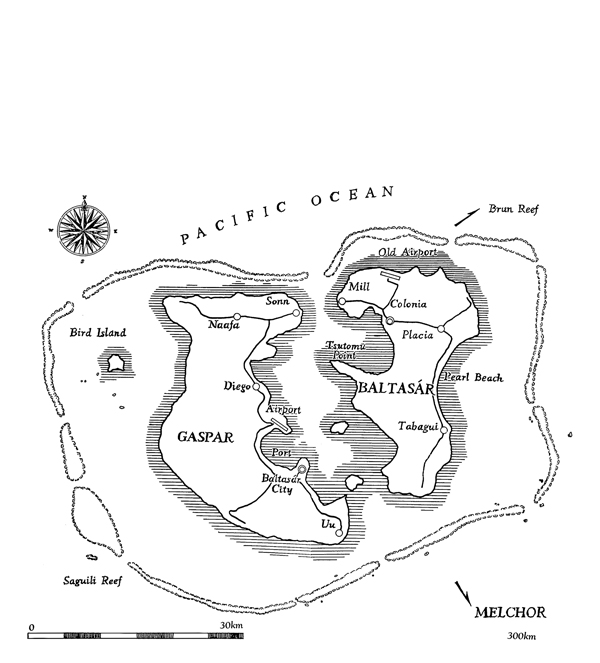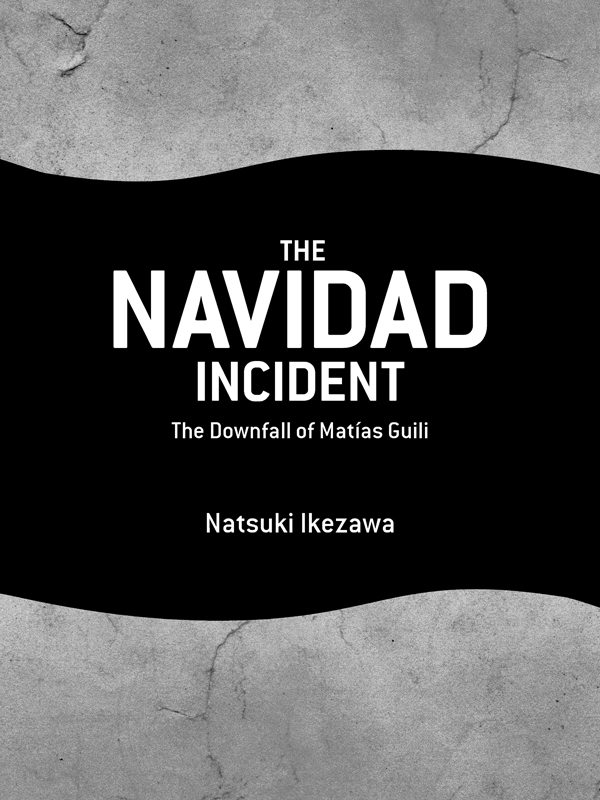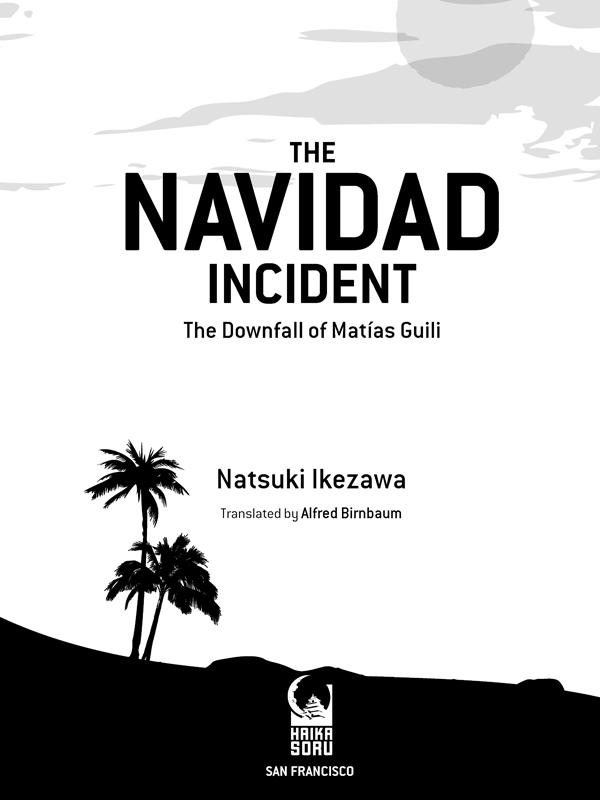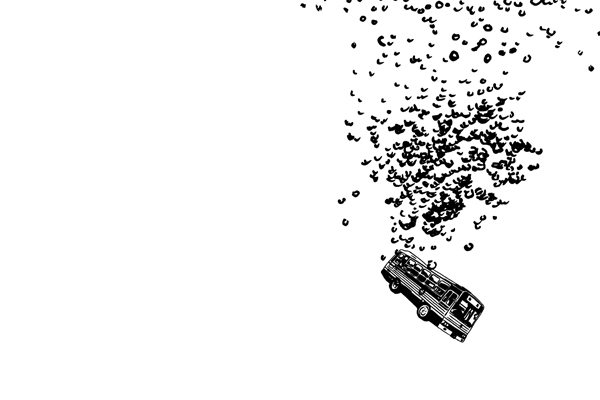The Navidad Incident






THE NAVIDAD INCIDENT: The Downfall of MatÃas Guili
Original title:
Mashiasu Giri no shikkyaku by Natsuki Ikezawa
Copyright © Natsuki Ikezawa 1993
Originally published in Japan by Shinchosha, Tokyo.
English translation copyright © Alfred Birnbaum 2012
English rights arranged through Bureau des Copyrights Français
Map illustration copyright © Shinchosha Publishing Co. Ltd.
Cover design by Sam Elzway
All rights reserved.
This book has been selected by the Japanese Literature Publishing Project (JLPP), an initiative of the Agency for Cultural Affairs of Japan.
No portion of this book may be reproduced or transmitted in any form or by any means without written permission from the copyright holders.
HAIKASORU
Published by VIZ Media, LLC
295 Bay Street
San Francisco, CA 94133
Library of Congress Cataloging-in-Publication Data
Ikezawa, Natsuki, 1945â
[Mashiasu Giri no shikkyaku. English]
The navidad incident : the downfall of MatÃas Guili / by Natsuki Ikezawa ; translation by Alfred Birnbaum.
p. cm.
ISBN 978-1-4215-4222-5
I. Birnbaum, Alfred. II. Title.
PL853.K45M3713 2012
895.6'35--dc23
2011047498
The rights of the author of the work in this publication to be so identified have been asserted in accordance with the Copyright, Designs and Patents Act 1988. A CIP catalogue record for this book is available from the British Library.
Haikasoru eBook edition
ISBN: 978-1-4215-4983-5

Let us begin in the morning. All good stories start at daybreak.
At five thirty the sky is still dark, but already the birds are twittering. To the east, lacquer black night takes on a hint of blue as the sun hesitates just below the horizon. The birds scatter crumbs of chorus to coax it up, and inevitablyâdo their voices carry that far?âthe first rays tinge the haze over the islands. A new day begins. A common, ordinary sunrise, yet the birds exalt each dawn as if it were a miracle.
Flocking to the treetops, their numbers swell into a ring of voices, louder and louder, until finally the multitude flies off in a dense black squall along the south coast toward the mangrove forests. Suddenly everything goes still. For just these thirty minutes each morning and again for thirty minutes at sunset, the sky is alive with their chatter.
Birds are the spirits of distant ancestors. While dying doesn't turn people into birds overnight, the longer since death, say the island elders, the louder they squawk. But why so many? In times past, when these islands had just risen from the sea, they say there were more people. All of them now are birds; even those birds reborn as humans or whales or bats all died and became birds again. Each must transmigrate through a bird existence to become something else. A bird becomes a bee, breeds thousands of buzzing offspring, then returns to bird form. Those thousands of baby bees in turn become birds. Since before time itself, the birds have steadily multipliedâand at dawn and dusk they are everywhere.
As long as anyone can remember, this place has been called Gagigula, the “noisy islands”; people being born, people passing away, whales and bats and bees breeding and dying, each successive generation sending new spirit flocks gyring overhead in swirling thunderheads of concentric darkness obliterating the very orb of the sun. Seafarers took alarm at these “racketous rocks” overpopulated with birds, and the epithet stuck. Even today, few would affect “international” airs by using the official name, the Republic of Navidad. The inhabitants still speak of Gagigula, the archipelago where sooner or later everyone becomes a bird. Once a bird, hereafter a birdâthis human form is a temporary thing. With food aplenty and no predators, these are happy islands thanks to the metaphysics of avian transmigration.
It is now half past six. The sun rises, along with the heat and tangy scent of the sea. Another idle morning is on the way. The islands, just nudging the equator, keep virtually the same sunrise hour the whole year round. Dawn light splits open the clouds the length of the eastern sky, illuminating wavering palm fronds, birds winging south. Out in the gardens, puddles from last night's showers now sparkle in the sun's short ascent. Sunrise does not last very long, nor make as grand an impression as sunset, yet the trees and buildings bathed in that warm citrus glow look lovelier than anything under the glaring noonday sun.
Sadly, not a soul gets up to see it. Beautiful though it may be, nature is boring. People don't make a thing of greeting the sun like birds, much less go to the window to look.
In the long gallery outside the Presidential Villa, ten petitioners stir awake one by one. They've camped out overnight, and it's been uncomfortable. Shaking their drowsy faces and blinking bleary eyes, each looks at the person next to him. Only then do they remember they're not back home on their own little islands but sprawled on a concrete floor in the capital. That's why their grass mats were so hard and cold. Will this be another day of waiting? Or will they be ushered in to see the President on some executive whim? The ways of officialdom are even less predictable than the weather. There are dozens of proverbs about the heavens, but not one about bureaucrats.
Slowly, each petitioner gets up and shuffles across the lawn, around the main building to a whitewashed plankway beside the three-motorboat dock house, and pees into the smooth waters. Then, flicking off the last drops, each slouches over to the middle of the lawn and washes up at the fountain that sprays silly arcs even in the dead of night. Then it's back to the concrete gallery, squat and wait. Soon some business-minded kids will come to sell them coconuts and bananas and steamed
ma'a
for breakfast.
Six months ago, the President announced he would personally receive petitioners from the outer islands. No one really believed it until one brave soul made his way to the Presidential Villa, knocked on the heavy door, and after just thirty minutes was shown in. The young man reemerged with a shy grin, and three months later workmen actually came to dredge the channel from the outer reef to the village landing as per his modest request. Yes, the Old Man made good on his wordâa good deed contracted to a crony.
Even so, getting to see the President is easier said than done. From the outer islands, either you're lucky enough to find space on an unchartered propeller plane, or you hop a once-a-month government cargo ship, or as a last resort you can paddle your own outrigger canoe. Even then, once you reach the capital, the elected leader of this island republic of seventy thousand is a busy man. Sometimes you wait a week or more, and a fortnight's absence makes any islander impossibly homesick. Some can't take it and simply pack up, spouting excuses to their island elders about changes in policy. “The President won't see us anymore.” And so, for one reason or another, an ever-changing queue of petitioners idles in the shaded galleries to either side of that pretentious Doric-columned portico.
By eight o'clock, one young petitioner, tired of just waiting, steals over to the great white mansion and tiptoes up to a window to peek inside. High ceilings and thick walls hung with gilt-framed paintings, tall heavy chairs and solid wood tablesâas if he hadn't already seen them ten times these past three days. No, what he really wants to see is on the opposite wall, that picture of a woman sitting on a beach in half-profile. Her fine features and full lips tell him she's not from this island, nor from his own. Maybe that big island three hundred kilometers to the southeast could have produced such a face. He's heard tell of beautiful women there. The young man is entranced by her pose, eyes demurely downcast, one hand on the sand. Her wavy hair trained over one shoulder, adorned with a white hibiscus. The sea in the background, that fringe of palms could be anywhere. Only the woman herself is a mystery, locked within the painting. Maybe she lives somewhere in this huge house? It's the first time an image has beguiled him like this, and he's not quite sure what the strange feeling means. How come he keeps returning to the window each day?
Yet as often as he looks, he never sees a soul inside. No one sitting in those heavy chairs, no one standing, no one cleaning. Never seen any doors open. He can scarcely guess what people do in this big building, not that it's any of his concern.
He simply waits. And occasionally, as an afterthought, he imagines how nervous he'll be when they finally invite him in. How small and pathetically out of place his people's request will seem. Though on the other hand, each day his request goes unheard, the more important it becomes not to hurry home, as if sheer endurance itself were progress.
Every once in a while an insider will queue up with a bogus petition, an easy favor to cover for yet another presidential scam. Then everyone is surprised by the friendly and efficient workings of the administration. To the eyes of official visitors arriving by black limousine, all these petitioners are ordinary citizens who love their President, a man they can approach directly. Of course visiting VIPs have no idea how many days these people have been kept waiting; they probably think the President listens to this many people daily. Which is exactly what the President wants them to believe. Clearing a waterway or two is a small price to pay; what matters is appearances, especially with foreign attachés who can influence ODA budgets.
The country is too small to justify setting up embassies or consulates. Navidad merely gets the occasional swing-through diplomatic mission. Journalists almost never come here. Meanwhile, the President consistently ignores foreign media. Seated in his spacious back office, he puts on a show of listening to his citizens, but really it's only to make his own profit-skimming schemes look democratic. Not that he's fooling anyone on the two main islands or that other island three hundred kilometers away to the southeast.

This morning, as always, President MatÃas Guili rises earlier than the birds. Last night it was close to three when he turned in, so he has slept only two hours. These past few years, he's been sleeping steadily less and less, though by inverse ratio his sleep now plumbs new depths. He never dreams. His mind blacks out until seconds before waking. To see him in that state, unmoving, hardly even breathing, you'd think he was dead. Especially since resuming office last year, he sleeps deeper and rises earlier than ever.
The President is honestly beginning to think that people don't need sleep. If he keeps on like this,
he
certainly won't. Those two hours will halve to one hour, then to thirty minutes. His breathing and heartbeat will slow to a complete stop. No wonder he never lets others into his bedroom. Like those sleepless saints of ages past, he knows he's not normal.
His private apartments are done in Japanese style. Every morning, like clockwork, he pops out of his futon, but has no memories of the day before. Everything apparently cuts out in the depths. So the day begins with recouping, and his bath is the place for this. But with his head a total blank, he needs reminding. A note left by his pillow reads,
Take bath. Put away memo.
If not for this, he might well spend the whole day sitting on the
tatami
not knowing what to do, nor even bothering to hide the evidence. Immediately, he files away the note in a waiting letterbox until he takes it out again at bedtime, a nightly routine.
No one else is in on this. If political opponents knew, they could easily assassinate him. All they'd have to do is substitute a different note:
Go to office. Open bottom desk drawer. Take out gun. Put gun to head. Pull trigger.
He is only too aware of the danger, so he never lets on about his sleeping habits, never gets too close to anyone in the late night or early morning hours.
As the note commands, he goes straight to the bathroom and steps into the
hinoki
wood tub, heated from the previous night to just the right temperature. Immersed up to his neck in hot water, he repeats his name a hundred times. This he can do without written prompting:
His Excellency MatÃas Guili, President of the Republic of Navidad.
He first realized the therapeutic value of a hot bath during his years in Japan. Not long after his return, at a time when no other island headman even had hot water, he built himself a small house and put in a hot tub, complete with boiler ordered from the United States.
Morning baths are good for strategic planningâcharting the day's agenda so as not to betray indecisiveness in publicâand nine years ago, when first inaugurated, he had a Japanese bath installed in these private apartments. Then a year ago he was ousted. Out of all his many privileges, the thing he missed most was bathtime. MatÃas hoped against hope that his usurper, Bonhomme Tamang, wouldn't have the place redone American style. Luckily, Tamang's three months in office didn't leave enough time for that. He never took to actually living here. Rather than assert his authority by remodeling the Presidential Villa, he tackled more immediate, pressing tasks. His idea of sincerity, a small man's sincerity. Then, not three months later, MatÃas came back on the rebound, once again to enjoy the privilege of soaking in his wooden tub any hour of the day or night.
In the amniotic bathwater, he recites his name and honorifics a hundred times, his self-possession returning little by little with each repetition. Thirty minutes later, fully restored, he dons a new
yukata
bathrobe and steps into the adjoining
dojo
, his private shrine. Fifteen minutes here is an equally important part of the morning ritual. The room is twelve tatami mats in sizeâalmost twenty square metersâwith a
tokonoma
alcove where hangs a large photograph of the President himself, the very same official portrait tacked up all over the country in full color. Only here it's black and white, mounted as a hanging scroll with a large vermilion seal in the lower left-hand corner. The absence of a national army may have prevented him from posing in full military regalia, but the photographer he flew in from Japan did an admirable job of evoking the Father of the Country gazing down on his people with severity and benevolence, medals stapled across his double-breasted suit. In real life, the President's slight stature might secretly make him a laughingstock in certain quarters, but this bust portrait betrays no such shortcoming.
For fifteen minutes each morning MatÃas puts his hands together and prays. After the name comes the image; from the photograph he replenishes whatever plenipotency may have leached away overnightâreplacing the private person with the official demeanor. He then heads for his study and takes out his executive log to bring himself up to date on all pending business from the previous day.